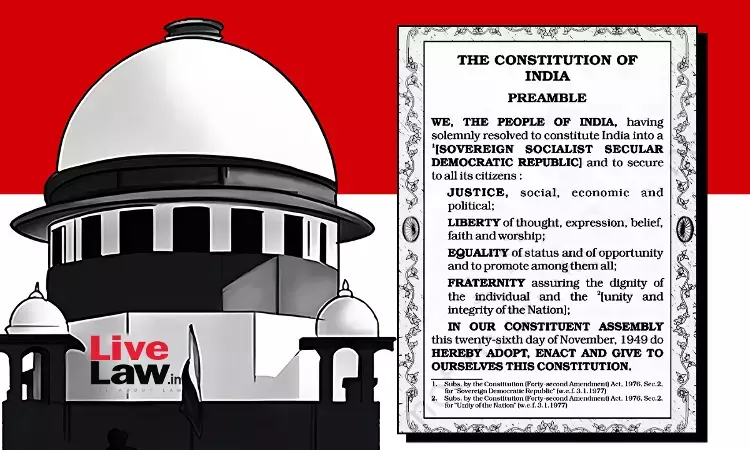


The Indian Supreme Court has rejected multiple petitions challenging the addition of the words "Socialist" and "Secular" in the Preamble of the Constitution. The Court, led by Chief Justice Sanjiv Khanna, stated that the Parliament has the power to amend the Constitution, including the Preamble. The Court also noted that secularism is a core feature of the Constitution and has been upheld in previous judgements. The petitions argue that the concept of "Dharma" and the failure of the Communist theory of state make the insertion inappropriate and that Indian citizens should not be compelled to be secular.
Supreme Court Upholds Parliament's Authority to Amend Constitution's Preamble
Background
The Preamble to the Constitution of India is a concise yet profound statement that sets forth the fundamental principles and aspirations of the Indian nation. Originally adopted in 1949, it has been amended several times over the years.
In 1976, during the Emergency period, the 42nd Amendment Act added the words "Socialist" and "Secular" to the Preamble. These additions aimed to reflect the nation's commitment to social justice and religious tolerance.
Recent Petition Challenges
In 2019, several petitions were filed in the Supreme Court challenging the validity of the 42nd Amendment. The petitioners argued that the addition of the words "Socialist" and "Secular" was inappropriate and violated the basic structure of the Constitution.
Supreme Court's Decision
In June 2022, a five-judge bench of the Supreme Court, led by Chief Justice Sanjiv Khanna, unanimously dismissed the petitions. The Court held that the Parliament has the power to amend the Constitution, including the Preamble. The Court also emphasized that secularism is a core value of the Constitution and has been consistently upheld by the judiciary.
Top 5 FAQs
1. What is the Preamble to the Constitution of India?
The Preamble is a brief statement that sets out the ideals and objectives of the Indian nation. It articulates the commitment to democracy, equality, liberty, and secularism.
2. When were the words "Socialist" and "Secular" added to the Preamble?
The words "Socialist" and "Secular" were added to the Preamble through the 42nd Amendment Act in 1976.
3. Why did the petitioners challenge the amendments?
The petitioners argued that the additions were inconsistent with the concept of "Dharma" and the failure of the Communist theory of state. They also claimed that citizens should not be compelled to be secular.
4. What did the Supreme Court rule?
The Supreme Court upheld the amendments, stating that the Parliament has the authority to amend the Constitution. The Court also affirmed the importance of secularism as a core value.
5. What is the significance of the Supreme Court's decision?
The decision confirms the Parliament's power to amend the Constitution and reinforces the principle of secularism as a fundamental aspect of India's constitutional framework.

The Kasibugga Venkateswara Temple in Srikakulam district was the site of a heart-wrenching stampede, causing multiple fatalities and affecting the community deeply. Chief Minister N. Chandrababu Naidu has expressed his sorrow over the unfortunate incident, as well as directing officials to ensure that those injured receive the best medical treatment possible. As local officials and public representatives are called to oversee relief operations, swift action is required to aid those affected and manage the situation effectively.

Indian Prime Minister Narendra Modi inaugurated the Shanti Shikhar Academy for Peaceful World in Raipur, praising the Brahma Kumaris organization for bridging India's ancient wisdom with the world's search for harmony. He credited the group's selfless service and spiritual discipline for their efforts towards universal peace. He positioned the Brahma Kumaris as protectors of India's soul and highlighted India's proactive role in addressing global crises such as disaster relief and environmental threats.

In an act of solidarity and protest, millions of Muslims in India used their Friday prayers to denounce the recent killings that took place in Pahalgam. The news comes amid growing tensions between the Muslim community and the Indian government. Many are viewing this as a sign of unity and determination from the Muslim population in India.

The state of Karnataka, or Kannada Rajyotsava, marked its 69th anniversary with a grand ceremony organized by the district administration in Mangaluru. District in-charge minister Dinesh Gundu Rao paid tribute to the leaders and writers who fought for a unified Kannada state and presented awards to 80 outstanding individuals and organizations. In his address, the minister highlighted the rich cultural and historical heritage of Karnataka and called for a sense of pride among its citizens.

Telangana's 'Run for Unity' event marked the 150th birth anniversary of Sardar Vallabhbhai Patel, India's first Deputy Prime Minister and architect of national integration. The event, carrying the message of "Ek Bharat - Shreshth Bharat", honored Patel's legacy of unity, sacrifice, and nation-building. Telangana BJP President N Ramachander Rao paid tribute to Patel and highlighted his pivotal role in integrating princely states, including Hyderabad, into the Indian Union. He also commended Prime Minister Narendra Modi and Home Minister Amit Shah for upholding Patel's ideals of national integrity.

The FBI has successfully stopped a potential terrorist attack in Michigan on Halloween weekend, according to FBI Director Kash Patel. Multiple suspects have been arrested after allegedly planning a violent attack that was connected to international terrorism. The suspects, whose ages range from 16 to 20, had engaged in firearms training and mentioned "pumpkin day" as a code for Halloween. White House Senior Director for Counterterrorism Seb Gorka confirmed the thwarted attack and stated that it was intended to occur during a time when children should be enjoying themselves.

Amidst criticism over his comments on his interfaith marriage to his Hindu wife, Usha, US Vice President JD Vance reiterates the importance of mutual respect, trust, and communication in their union. While he hopes she may someday embrace his Christian faith, her decision to maintain her beliefs is respected. Despite their differences, the couple has agreed to raise their children in the Christian faith, with Usha supporting them. At a Turning Point USA event, Vance also reaffirmed the couple's balanced approach towards managing their interfaith household.

Three days after TVK leader Vijay met with the family members of the victims of the Karur tragedy, Central Bureau of Investigation (CBI) team led by Superintendent of Police Praveen Kumar visited the rally site in Velusamypuram where the deadly stampede occurred. The officers conducted inquiries with locals and studied the topography of the area, as well as Vijay's travel route. The transfer of the case to the CBI and the re-registration of the FIR remains a secret and its contents have not been made public yet.

Prime Minister Narendra Modi praised the demonstrations by the indigenous dog squad as one of the most admired parts of the Rashtriya Ekta Diwas parade at the Statue of Unity. The squad included breeds like Rampur Hounds and Mudhol Hounds, with Mudhol Hound "Riya" leading the pack. PM Modi also applauded the Assam Police's Motorcycle Daredevil Show and the cultural performances at the parade, which reflected the theme of "Unity in Diversity." The event was attended by five Shaurya Chakra awardees and 16 gallantry medal winners from the CRPF and BSF.

The FBI has announced the arrest of multiple individuals in Michigan who were planning a violent attack over the Halloween weekend. Director Kash Patel praised the vigilance of law enforcement personnel and assured the public that there was no threat to the community. These arrests come after a previous arrest in May of a Michigan man who allegedly planned an attack on a US Army facility on behalf of the Islamic State group. The suspect remains in federal custody and is expected to plead guilty.